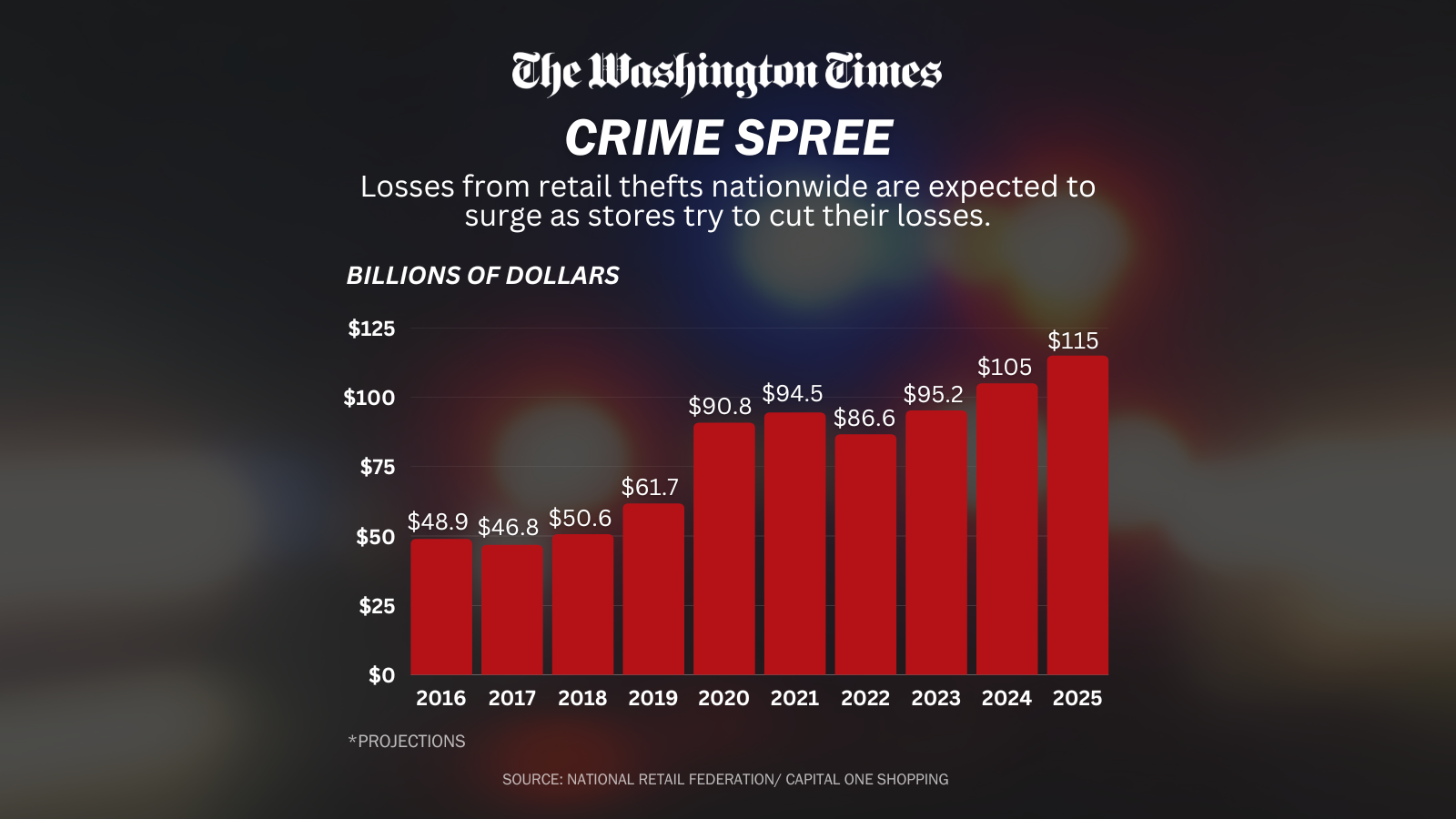Retailers have ordered employees to ignore gangs of shoplifters and started firing workers who buck the policy as an organized crime wave sweeps stores nationwide.
Losses from retail thefts nationwide will surge from $86.6 billion last year to at least $115 billion in 2025, bank holding company Capital One estimates, as stores lock up goods, bolster security and cut their losses rather than risk the financial liability of confronting thieves.

Shoplifting incidents cost retailers an average of $461.86 in 2020, and stores caught only about 2% of the incidents, according to Capital One. Business analysts say the cost is lower than the consequences of an employee getting injured, or worse, while trying to stop a theft.
“They’d rather take a loss on $500 in goods than eat what it costs to pay a medical bill, get sued or replace an employee,” said Jason Friedman, a Dallas-based lawyer who litigates workplace lawsuits. “They do it to protect the employees, so they don’t feel they have to stop a theft to keep their jobs.”
Several reports show companies firing workers who intervene in heists.
In May, athletic apparel retailer Lululemon fired two Atlanta-area employees who called the police after following a gang of masked thieves out of their store. Lululemon insisted that it terminated the workers for following the shoplifters, not for calling the police.
Last month, news outlets reported that Kroger-owned King Soopers fired Colorado employee Santino Burrola after he captured three shoplifters on video leaving the supermarket on Father’s Day with $500 worth of laundry detergent. Mr. Burrola called the police and posted the video to TikTok, where rapper Snoop Dogg reposted it.
Also last month, a Lowe’s store in Georgia briefly fired Donna Hansbrough, 68, after she tried to stop three shoplifters from leaving with $2,000 in merchandise. One shoplifter punched the employee in the face three times, and the company reinstated her after a public backlash.
In a June 9 statement on store safety, the National Retail Federation praised businesses for training employees to contact the police and avoid “situations that may result in confrontation.”
“The number one priority for retailers is ensuring the safety and security of both customers and workers,” the retail trade group said.
As retailers take a zero-tolerance approach to confronting thieves, lawmakers are debating whether soft-on-crime policies in America’s largest cities have contributed to a surge in organized retail crime, including daytime smash-and-grab robberies and follow-home “jugging” thefts.
The National Retail Federation reported in June that 53% of consumers responding to a survey said retail crimes such as shoplifting and looting have increased in their communities since the start of COVID-19.
The retail group found that the “inventory shrink” of items lost to customer theft, employee theft, human error or other reasons hit $94.5 billion in 2021, up 53% from 2019.
On Capitol Hill, former prosecutors told House lawmakers at a June 13 hearing that criminal policies downgrading shoplifting and theft to less-serious offenses in recent years have roused crooks to act without impunity.
Some big-box retailers have abandoned crime-ridden cities as shoppers avoid the most targeted stores.
In Northern California, Nordstrom and Banana Republic have left the San Francisco Centre shopping mall, and mall operator Westfield is leaving the city.
Nike and REI have shut down stores in Portland, Oregon, because of brazen theft. Walmart has abandoned Chicago’s Southside and parts of the District of Columbia, and Best Buy is retreating nationwide because of decreased consumer spending and theft-induced losses.
Some CVS and Walgreens locations have started locking body wash, lotion, toothpaste and deodorant behind glass to prevent theft.
With zero-tolerance policies to protect employees and their ledgers, companies are reporting snowballing thefts, Mr. Friedman said.
“What if a worker gets shot, stabbed or killed? The employer is going to bear the cost of their medical expenses, of their being out of work and of finding a replacement,” he said. “At the end of the day, it’s going to cost more to stop retail crimes than to let them happen.”
As retailers restrain their workers, public officials are scrambling to resolve the crisis.
A spokesperson for California Attorney General Rob Bonta pointed to progress from working with retailers and online marketplaces to prosecute organized gangs that steal goods to resell online or return to stores for refunds.
Mr. Bonta, a Democrat, signed a June 20 agreement to share law enforcement data on the crimes with business owners. He also has advised consumers and workers to submit reports and tips about the thefts to oag.ca.gov/retailcrime.
“The fact is, we are stronger when we work together as a united front,” Mr. Bonta said.
In an email to The Washington Times, an FBI spokesperson pointed to a statement on the agency’s website noting that organized retail theft drives up consumer prices. The FBI does not track retail crimes separately, the spokesperson noted.
“The FBI focuses on the most significant retail theft cases involving the interstate transportation of stolen property as organized retail theft is a gateway crime,” the statement said. “Major crime rings use the illicit proceeds to fund other crimes like health care fraud, money laundering and potentially terrorism.”
According to a recent NewsNation/Decision Desk HQ poll, 72% of voters believe employers shouldn’t punish workers for intervening against shoplifters.
Companies say the crime wave leaves them little choice.
Among small-business owners responding to a poll by Idaho-based recruitment agency RedBalloon, 82% expressed concern about a growing trend of public officials failing to prosecute retail theft.
“With many left-leaning judges slapping property owners with huge liability for injuring a criminal when stopping them in the act of theft, it’s no wonder that many business owners feel helpless,” Andrew Crapuchettes, RedBalloon CEO, told The Times.
• Sean Salai can be reached at ssalai@washingtontimes.com.




Please read our comment policy before commenting.